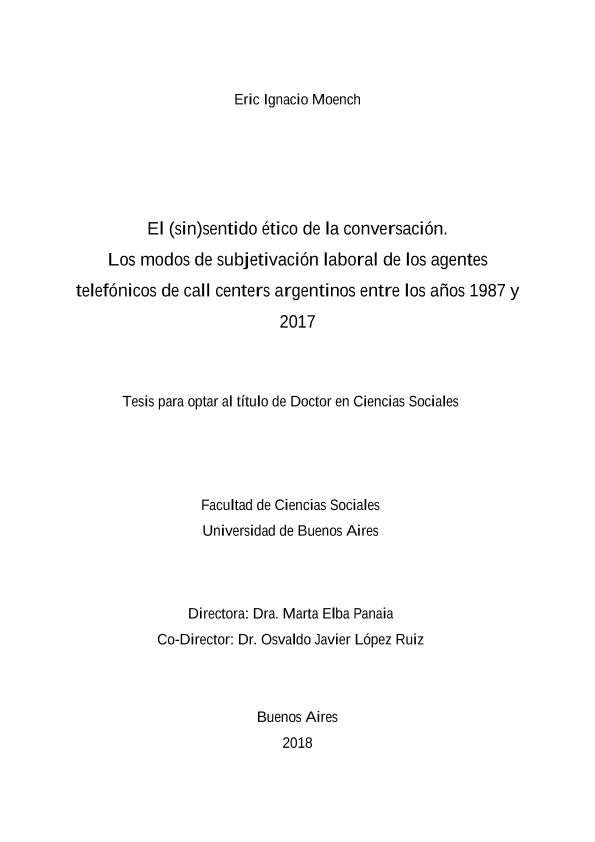Tesis doctoral
¿Cómo, por qué, para qué hacemos lo que hacemos, cuáles son los efectos de hacer lo que hacemos? ¿Qué sentido ético tienen nuestras conductas laborales en un mundo competitivo? Poner estos interrogantes solamente sobre los hombros de los agentes telefónicos puede sonar algo injusto. Porque nuestras inquietudes los exceden: también nos preguntamos, como en eco, por nuestra actualidad, por lo que somos hoy, y por cómo fuimos llevados a serlo. Sin embargo, los agentes telefónicos condensan de una manera significativa tales inquietudes, que enfocarnos en su estudio podría ser heurísticamente fértil.Entre los agentes telefónicos se establecen ciertas formas comunes del hacer y ser laborales en los call centers, que podrían ser resumidas bajo la etiqueta de competencias socio-emocionales, que se ponen en acción para gestionar clientes. Pero ¿qué ocurre cuándo tales competencias, claves para el ejercicio de la actividad laboral, se saturan de procedimientos, como los indicadores de desempeño calidad, servicio, eficiencia, procesos, resultados, y una larga lista de etcéteras? En torno a la gestión de su trabajo los agentes telefónicos han internalizado indicadores de performances y de superación individual, han (trans)formado sus actitudes personales, han modulado sus formas de hablar y escuchar al cliente, han desplegado nuevas formas de (des)ahogos emocionales, en suma, han incorporado todo tipo de formas de hacer y de ser en las que (auto)gestionan sus cuerpos, mentes, palabras, emociones, actitudes. El estudio de los modos de subjetivación laboral entre los agentes telefónicos de call centers en Argentina, entre los años 1987 y 2017, nos ofrecerá un acceso privilegiado a esas particulares formas de hacer y de ser. ¿Quién es, entonces, este sujeto laboral llamado agente telefónico, que se constituye entre las fronteras de lo que llamaremos experiencias laborales manageriales?Avanzaremos en una crítica que nos muestre quiénes son los agentes telefónicos en la actualidad, a la luz de cómo han sido llevados a ser lo que son. Esperamos con ello explicar de forma acabada las angustias, los miedos, las expectativas, las ansiedades, las luchas, las alegrías que rodean su paso por los call centers. Confiamos en que, al mismo tiempo, esta tesis pueda volverse una suerte de artefacto político, en el sentido de iluminar cómo funcionan ciertos mecanismos de poder en el ámbito laboral, y dejar en claro que la forma en que funcionan es producto de los artificios de los hombres, y no de una naturaleza de las cosas o de un sentido inalterable de la historia. How, why, what for we do what we do, which are the effects of doing what we do? What ethical sense have our work behavior in a competitive world? Putting these questions only in telephone agents shoulders, it may sound a little bit unfair. Because our concerns exceed them: we also ask ourselves, as an echo, about our present, for what we are today, and for how we were led to be. However, telephone agents significantly condense such concerns, that’s why focusing on their study could be heuristically fertile. Among the telephone agents, are certain common ways of doing and being at work in call centers, that might be summarized under the label of social-emotional skills, then put into action to manage clients. But, what happens when such skills, keys for the work practice, are saturated by procedures such as performance indicators about quality, service, efficiency, processes, results, and a long list of etceteras? Regarding the management of their work, telephone agents have internalized performance indicators and individual improvement, have transformed their personal attitudes, have modulated their ways of speaking and listening to the client, they have displayed new forms of emotional relief, to sum up, they have incorporated all kinds of ways of doing and being in which they self-manage their bodies, minds, words, emotions, attitudes. The study of the modes of labor subjectivation among telephone agents of call centres in Argentine, between 1987 and 2017, will offer us a privileged access to these particular ways of doing and being. So, who is this labor subject called telephone agent, who is constituted between the borders of what we will call management work experiences? We will advance in a critique that shows us who the telephone agents are today, indicating how they have been led to be what they are. We hope with this to explain in a finished way the anguish, the fears, the expectations, the anxieties, the struggles, the joys that surround their passage through the call centres. We hope that, at the same time, this thesis can become a sort of political tool, in the sense of showing how certain power mechanisms work in the workplace, and make it clear that the way they work is a man-made artifice, and not a nature thing or an unalterable sense of history.
El (sin)sentido ético de la conversación: Los modos de subjetivación laboral de los agentes telefónicos de call centers argentinos entre los años 1987 y 2017
Moench, Eric Ignacio

Director:
Panaia, Marta Elba

Codirector:
Lopez Ruiz, Osvaldo Javier

Fecha de publicación:
16/11/2018
Idioma:
Español
Clasificación temática:
Resumen
Archivos asociados
Licencia
Identificadores
Colecciones
Tesis(INCIHUSA)
Tesis de INST. DE CS. HUMANAS, SOC. Y AMBIENTALES
Tesis de INST. DE CS. HUMANAS, SOC. Y AMBIENTALES
Citación
Moench, Eric Ignacio; Panaia, Marta Elba; Lopez Ruiz, Osvaldo Javier; El (sin)sentido ético de la conversación: Los modos de subjetivación laboral de los agentes telefónicos de call centers argentinos entre los años 1987 y 2017; 16-11-2018
Compartir



